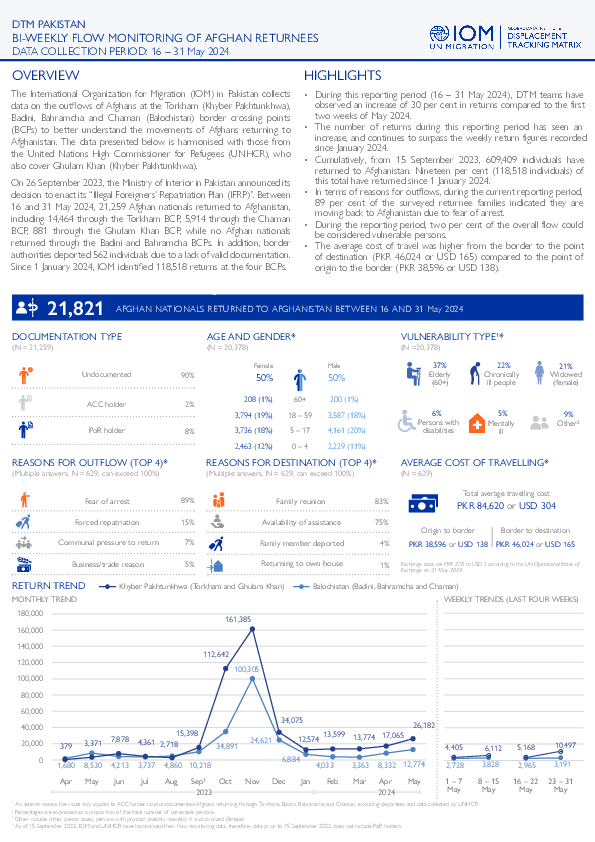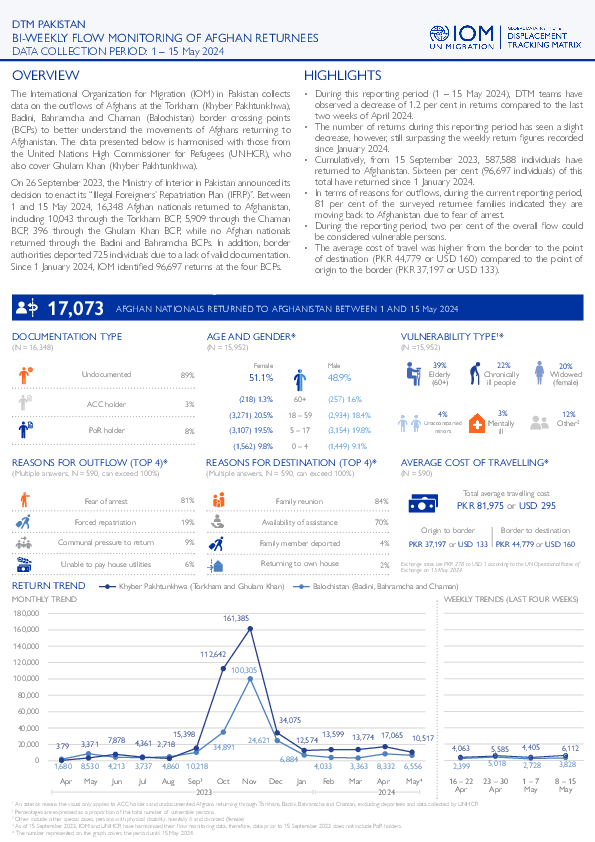-
Countries
-
Data and Analysis
-
Special Focus
-
Crisis Responses
Returns and displacement in Afghanistan
Feb 15 2017
Print
Countries in this response
- Active DTM operation
- Past DTM operation
Check out the interactive dashboard
Afghanistan - Baseline (B1) Assessment 2024
Check out the interactive dashboard
Afghanistan - Flow Monitoring 2024
افغانستان - راپور مختصر جریان عبور و مرور (۱۴ - ۲۰ جولای ۲۰۲۴) [DARI]
فعالیت نظارت بر جریان عبور و مرور برنامه سیستم ردیابی بیجاشدگان (دی تی اِم) سازمان بین المللی مهاجرت افغانستان برای این دیزاین شده تا درک و فهم بهتر از تحرکات و تغییرات عبور و مرور در مرزهای افغانستان را بدست آورد.
افغانستان - د خلکو د تګ راتګ په اړه لنډ راپور (۱۴ - ۲۰ جولای ۲۰۲۴) [PASHTO]
د افغانستان آي اُو اِم د (ډي تي اِم) پروګرام د خلکو د تګ راتګ د جریان څارنې فعالیت د لپاره ډیزاین شوي ترڅو د ایران اسلامی جمهوریت او پاکستان سره په سرحدی پولو کې په سرحدونو کې د خوځښت او تګ راتګ په اړه ښه پوه شي.
Afghanistan - Flow Monitoring Snapshot (14-20 July 2024) [ENG]
The IOM Afghanistan’s DTM Flow Monitoring activity is designed to provide insights into the mobility patterns at Afghanistan’s border points with the Islamic Republic of Iran and Pakistan.
افغانستان - راپور مختصر جریان عبور و مرور (۷ - ۱۳ جولای ۲۰۲۴) [DARI]
فعالیت نظارت بر جریان عبور و مرور برنامه سیستم ردیابی بیجاشدگان (دی تی اِم) سازمان بین المللی مهاجرت افغانستان برای این دیزاین شده تا درک و فهم بهتر از تحرکات و تغییرات عبور و مرور در مرزهای افغانستان را بدست آورد.
افغانستان - د خلکو د تګ راتګ په اړه لنډ راپور (۷ - ۱۳ جولای ۲۰۲۴) [PASHTO]
د افغانستان آي اُو اِم د (ډي تي اِم) پروګرام د خلکو د تګ راتګ د جریان څارنې فعالیت د لپاره ډیزاین شوي ترڅو د ایران اسلامی جمهوریت او پاکستان سره په سرحدی پولو کې په سرحدونو کې د خوځښت او تګ راتګ په اړه ښه پوه شي.
Afghanistan - Flow Monitoring Snapshot (7-13 July 2024) [ENG]
The IOM Afghanistan’s DTM Flow Monitoring activity is designed to provide insights into the mobility patterns at Afghanistan’s border points with the Islamic Republic of Iran and Pakistan.
Afghanistan - Flow Monitoring Quarterly Report 2 (April - June 2024) [ENG]
Frequent movement at the borders with the Islamic Republic of Iran and Pakistan have been influenced by a variety of factors over the past few decades.
Pakistan — Flow Monitoring of Afghan Returnees — Bi-Weekly Report (16 – 30 June 2024)
The International Organization for Migration (IOM) in Pakistan collects data on the outflows of Afghans at the Torkham (Khyber Pakhtunkhwa), Badini, Bahramcha and Chaman (Balochistan) border crossing points (BCPs) to better understand the movements of Afghans returning
Pakistan — Flow Monitoring of Afghan Returnees — Bi-Weekly Report (1 – 15 June 2024)
The International Organization for Migration (IOM) in Pakistan collects data on the outflows of Afghans at the Torkham (Khyber Pakhtunkhwa), Badini, Bahramcha and Chaman (Balochistan) border crossing points (BCPs) to better understand the movements of Afghans returning to Afghanistan.
Pakistan — Flow Monitoring of Afghan Returnees — Bi-Weekly Report (16 -31 May 2024)
The International Organization for Migration (IOM) in Pakistan collects data on the outflows of Afghans at the Torkham (Khyber Pakhtunkhwa), Badini, Bahramcha and Chaman (Balochistan) border crossing points (BCPs) to better understand the movements of Afghans returning
Pakistan — Flow Monitoring of Afghan Returnees — Bi-Weekly Report (1 -15 May 2024)
The International Organization for Migration (IOM) in Pakistan collects data on the outflows of Afghans at the Torkham (Khyber Pakhtunkhwa), Badini, Bahramcha and Chaman (Balochistan) border crossing points (BCPs) to better understand the movements of Afg
Pakistan — Flow Monitoring of Afghan Returnees — Bi-Weekly Report (16 - 30 April 2024)
The International Organization for Migration (IOM) in Pakistan collects data on the outflows of Afghans at the Torkham (Khyber Pakhtunkhwa), Badini, Bahramcha and Chaman (Balochistan) border crossing points (BCPs) to better understand the movements of Afghans returning to Afghanistan.
Pagination
Afghanistan – Baseline Area Assessment B1 – Round 1
Apr 08 2024
<p>IOM Afghanistan launched the first round of the DTM Baseline Area Assessment B1 in January 2024 as part of its ongoing efforts to collect crucial data on population mobility dynamics, specifically displacement and returns. In particular, the B1 activity seeks to map the presence of mobile…
Afghanistan - Flow Monitoring Counting (Since January 10 2024)
Jul 04 2024
<p>IOM Afghanistan's DTM Flow Monitoring activity, initiated at the beginning of 2024, seeks to quantify and better understand the mobility dynamics at Afghanistan’s borders. On 10 January 2024, DTM began deploying field teams at four border crossing points with the Islamic Republic of…
Pakistan - Flow Monitoring Registry - 2023
Mar 06 2024
<p>The International Organization for Migration (IOM) in Pakistan collects data on the outflows of Afghans at the Torkham (Khyber Pakhtunkhwa) and Chaman (Balochistan) border crossing points (BCPs) to better understand the movements of Afghans returning to Afghanistan. The dataset is…
Pakistan - Flow Monitoring Registry - 2017
Aug 03 2023
Since January 2017, overall, 97,225 returnees have been reported returning through Torkham and Chaman/Spin Boldak.
Pakistan - Flow Monitoring Registry - 2018
Aug 03 2023
During this period, the Displacement Tracking Matrix (DTM) recorded 30,413 Afghan nationals returning to Afghanistan from Pakistan through the Torkham (55%) and Chaman (45%) border crossings. One in two recorded returnees was a child (56%). Out of the total returnees, 71 per cent were undocumented…
Pakistan - Flow Monitoring Registry - 2021
Aug 03 2023
27,829 undocumented returnees were reported to have crossed the two borders, out of which 14,185 were females and 13,644 were males. Additionally, border authorities facilitated the return of 1,740 individuals due to the lack of legal documentation to remain in Pakistan. Therefore, information…
Pakistan - Flow Monitoring Registry - 2019
Aug 03 2023
Between January 1 and 31 December 2019, the Displacement Tracking Matrix (DTM) recorded 17,286 undocumented Afghan nationals returning from Pakistan to Afghanistan through the Chaman and Torkham border crossings, each accounting for 74 per cent and 26 percent of the total border crossings. The…
Pakistan - Flow Monitoring Registry - 2020
Aug 02 2023
The number of returnees has decreased significantly in comparison to the previous year, 6,661 individuals in 2020 compared to 17,286 in 2019. Besides a variety of push and pull factors, the steep decline in return movements can also be attributed to the closure of the borders due to the COVID-19…
Pakistan - Flow Monitoring Registry - 2022
Aug 03 2023
The number of undocumented Afghans returning from Pakistan has increased significantly, nearly threefold, in comparison to 2021. This rise in returns can be attributed to the significant geopolitical changes that took place in Afghanistan between 2021 and 2022. The data also shows that the number…
Afghanistan – Community-Based Needs Assessment, Settlement Level Dataset, Round 16 (September-December 2022)
Jun 06 2023
<p>The CBNA is an integral component of DTM's Baseline Mobility Assessment (BMA), which (in a jointly released dataset) tracks mobility and displacement. The objective of the CBNA is to provide a baseline for programmatic priorities and geographical targeting of assistance, by supplying…
Afghanistan - Baseline Assessment, Settlement Level Dataset, Round 16 (September-December 2022)
Jun 06 2023
This file contains data from DTM Afghanistan's 16th round of the Baseline Mobility Assessment (BMA), which was conducted between September and December 2022. DTM has been conducting the BMA in Afghanistan since 2016 to track mobility, provide information on population estimates, locations and…
Afghanistan - Emergency Community-Based Needs Assessment - Round 15 (March-April 2022)
Jul 12 2022
Since December 2019, the Community-Based Needs Assessment (CBNA)has been included as a standard component of the Baseline Mobility Assessment (BMA) exercise as a way to provide a more comprehensive view of multi-sectoral needs in settlements hosting IDPs and returnees. In Round 15, the DTM team in…
Afghanistan - Baseline Assessment, Settlement Level, Round 15 (March-April 2022)
Jul 14 2022
A baseline assessment is a sub-component of mobility tracking. It aims to collect data on IDP, migrant and returnee population presence in a defined administrative area of the country. This dataset contains information by settlement. Settlement is the lowest unit of observation used in Afghanistan.
Afghanistan - Baseline Assessment, District Level, Round 15 (March-April 2022)
Jul 07 2022
A baseline assessment is a sub-component of mobility tracking. It aims to collect data on IDP, migrant and returnee population presence in a defined administrative area of the country. This dataset presents a summary at the district level of data collected by DTM in Afghanistan.
Afghanistan - Community Based Needs Assessment, Round 14 (Nov-Dec 2021)
Mar 02 2022
A Community-Based Needs Assessment (CBNA), intended as an integral component of DTM's Baseline Mobility Assessment to provide a more comprehensive view of multi-sectoral needs in settlements hosting IDPs and returnees.
Afghanistan - Baseline Assessment Settlement Round 14
Mar 02 2022
A baseline assessment is a sub-component of mobility tracking. It aims to collect data on IDP, migrant or returnee population presence in a defined administrative area of the country. This dataset contains information by settlement. Settlement is the lowest unit of observation used in Afghanistan
Afghanistan - Baseline Assessment District Round 14
Mar 02 2022
A baseline assessment is a sub-component of mobility tracking. It aims to collect data on IDP, migrant or returnee population presence in a defined administrative area of the country. This dataset presents a summary at the district level of data collected by DTM in Afghanistan.
Afghanistan - Community Based Needs Assessment (January—March 2021)
Jun 30 2021
A Community-Based Needs Assessment (CBNA), intended as an integral component of DTM's Baseline Mobility Assessment to provide a more comprehensive view of multi-sectoral needs in settlements hosting IDPs and returnees.
Afghanistan - Community Based Needs Assessment (July—December 2020)
Feb 05 2021
A Community-Based Needs Assessment (CBNA), intended as an integral component of DTM's Baseline Mobility Assessment to provide a more comprehensive view of multi-sectoral needs in settlements hosting IDPs and returnees.
Afghanistan - Community Based Needs Assessment (April—June 2021)
Sep 15 2021
A Community-Based Needs Assessment (CBNA), intended as an integral component of DTM's Baseline Mobility Assessment to provide a more comprehensive view of multi-sectoral needs in settlements hosting IDPs and returnees.
















